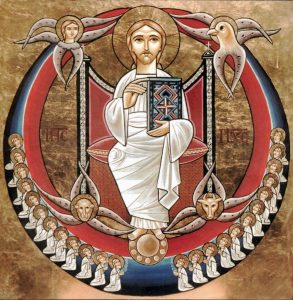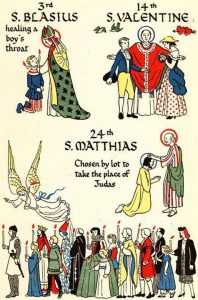Tag Archives: devotions
Indulgence at year end, at beginning of new
 Catholics at the end of the calendar year and at the beginning of the new one do so in an atmosphere of prayer. Our faith is one of Thanksgiving. Hence, those who enter into prayer with the intention of giving thanks to the Most Blessed Trinity for the blessings received and supplicating God the Holy Spirit for the grace to be His faithful disciple in the New Year, may gain a plenary indulgence for the public recitation or chanting in Church of the Te Deum on Dec. 31 and the Veni Creator on January 1. It must be in Church, as a liturgical function, like at the end of Mass, Adoration of the Blessed Sacrament or one the Divine Offices. The usual conditions for gaining the indulgence apply. The General Conditions are:
Catholics at the end of the calendar year and at the beginning of the new one do so in an atmosphere of prayer. Our faith is one of Thanksgiving. Hence, those who enter into prayer with the intention of giving thanks to the Most Blessed Trinity for the blessings received and supplicating God the Holy Spirit for the grace to be His faithful disciple in the New Year, may gain a plenary indulgence for the public recitation or chanting in Church of the Te Deum on Dec. 31 and the Veni Creator on January 1. It must be in Church, as a liturgical function, like at the end of Mass, Adoration of the Blessed Sacrament or one the Divine Offices. The usual conditions for gaining the indulgence apply. The General Conditions are:
The traditional norm for going to confession, receiving Holy Communion, and praying for the intentions of the pope, in order to gain a plenary indulgence, was 8 days before or after doing the prescribed work (counting the day of the work). In the Great Jubilee Year 2000, the Apostolic Penitentiary relaxed this norm to “several days (about 20) before or after the indulgenced act” (Gift of the Indulgence, General remarks, 5).
Some may ask if the norm of 20 days remains today. The Apostolic Penitentiary responded that the norm of “about 20 days” remains in effect, since it was contained under the “General remarks on indulgences,” and not under those specific to the Jubilee Indulgence.
In sum, from Gift of the Indulgence, therefore, the usual conditions given in the Church’s tradition:
1. This is how an indulgence is defined in the Code of Canon Law (can. 992) and in the Catechism of the Catholic Church (n. 1471): “An indulgence is a remission before God of the temporal punishment due to sins whose guilt has already been forgiven, which the faithful Christian who is duly disposed gains under certain prescribed conditions through the action of the Church which, as the minister of redemption, dispenses and applies with authority the treasury of the satisfactions of Christ and the saints”.
2. In general, the gaining of indulgences requires certain prescribed conditions(below, nn. 3, 4), and the performance of certain prescribed works …..
[N.B. The grants of indulgence are contained in the Enchiridion Indulgentiarum (4th ed., 1999), in special grants of the Holy See, such as for the Year of the Holy Eucharist, and in special grants which bishops may establish for their dioceses.]
3. To gain indulgences, whether plenary or partial, it is necessary that the faithful be in the state of grace at least at the time the indulgenced work is completed.
[N.B. Thus, one must be a Catholic in communion with the Pope, i.e. not excommunicated or in schism.]
4. A plenary indulgence can be gained only once a day. In order to obtain it, the faithful must, in addition to being in the state of grace:
—have the interior disposition of complete detachment from sin, even venial sin;
—have sacramentally confessed their sins;
—receive the Holy Eucharist (it is certainly better to receive it while participating in Holy Mass, but for the indulgence only Holy Communion is required);
—pray for the intentions of the Supreme Pontiff.
5. It is appropriate, but not necessary, that the sacramental Confession and especially Holy Communion and the prayer for the Pope’s intentions take place on the same day that the indulgenced work is performed; but it is sufficient that these sacred rites and prayers be carried out within several days (about 20) before or after the indulgenced act. Prayer for the Pope’s intentions is left to the choice of the faithful, but an “Our Father” and a “Hail Mary” are suggested. One sacramental Confession suffices for several plenary indulgences, but a separate Holy Communion and a separate prayer for the Holy Father’s intentions are required for each plenary indulgence.
6. For the sake of those legitimately impeded, confessors can commute both the work prescribed and the conditions required (except, obviously, detachment from even venial sin).
7. Indulgences can always be applied either to oneself or to the souls of the deceased, but they cannot be applied to other persons living on earth.



